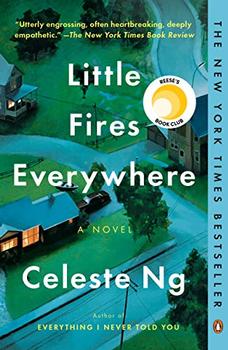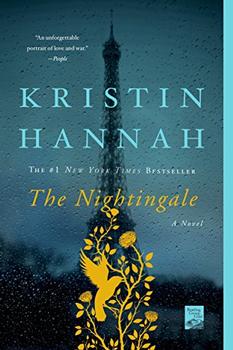Summary | Excerpt | Reviews | Beyond the book | Read-Alikes | Genres & Themes | Author Bio

A Novel
by Alina GrabowskiAfter Lucy Anderson falls to her death at a high school party, no one in Nashquitten, her gloomy, rain-battered hometown on the Massachusetts coast, seems to be quite sure what happened. Did she jump? Was she pushed? Or, as someone with epilepsy, did she have a seizure in the wrong place at the wrong time? The town is no stranger to teen deaths, but Lucy's has more troubling ambiguity than the drunk driving and overdoses which have become routine. Across ten chapters narrated by ten different female voices, Women and Children First draws a sharp portrait not so much of the ambitious, mercurial teenager—but of the community that let her slip away.
Each narrator has her own relationship to Lucy, be it close or tenuous. There's Jane, a classmate who "knew of her"; Rae, an older family friend; Brynn, her grieving mother, who provides the novel's most affecting moments. As the story progresses, however, it's not the loss of Lucy that comes to unite these women's voices, but rather the common color of their broader experiences. With her talent on display, debut author Alina Grabowski manages to pick up one of the most shopworn tropes—the death of the promising young woman—and craft a thoughtful, funny, and at times furious portrayal of female life in the 2020s, full of its impossible demands and daily frustrations.
And in this caustic vision of small-town America, frustrations abound. Something is rotten in Nashquitten, and not just the dead fish that wash up on the shore. Poverty is beginning to wear away at the edges of the town, just as the rising sea wears away at the coast. Scientists say the entire community will be underwater by the end of the century, so where's the incentive to change? Those who can, leave; those who can't, stay—and the failure of staying clings to them like the smell of those rotting fish.
The prose is biting, but although cynicism may be Grabowski's signature style, her writing is thankfully too sharp and too lively to ever wallow in outright despair. Even if Women and Children First lacks variety of voice—too many of its narrators slip into the same sardonic cadence—it's impossible to deny the author's knack for pulling out the short, cutting sentence that captures a very 21st-century malaise. "It felt like the world had ended," one high-schooler says as she contemplates Nashquitten's polluted coastline, "and some stupid person had chosen us as the survivors."
This sense of abandonment bleeds from chapter to chapter. Even the children of Women and Children First are world weary, with enough experience of those in positions of authority—which is to say, of men—to be cured of youthful illusions. Fathers are absent and neglectful or present and ineffectual; the local high school shelters on its faculty not one but two abusers of differing stripes. Layla, the overworked student counselor, comments that growing up is realizing the world is "nothing more than poorly constructed fantasies of power and order." With justified anger, Grabowski leaves the reader in little doubt as to who benefits from those fantasies, or what sad role young women are expected to play in them.
The response, especially from the teenage girls, is vicious self-preservation. It's smart to have allies in Nashquitten, but any deeper notion of shared womanhood risks too much—getting through the day is a hard-toothed business, and experience has made Grabowski's narrators wary of false promises that could leave them ill-equipped. When a video of Lucy having a seizure starts circulating online, her classmates' impulse is to laugh along with the crowd. That's the danger of girls, one narrator says: "They look like deer when, really, they're wolves." You could call them self-centered, but the novel has a larger point to make. If they don't look out for themselves, who else will?
But no woman is an island, and the emotional force of this novel comes in proving it. From the solitary "I" of the monologues, the ten chapters of Women and Children First thread together a collective "we" that celebrates a shared female experience to which their narrators can't afford to admit. Grabowski's confident debut may be bleak, but not hopeless. As Lucy lies dying, a classmate holds her and whispers into her ear the story of two young girls long ago who, with only drums and pipes, scared off an entire army. The message seems clear: there is power in women bringing their voices together.
![]() This review was originally published in The BookBrowse Review in June 2024, and has been updated for the
June 2025 edition.
Click here to go to this issue.
This review was originally published in The BookBrowse Review in June 2024, and has been updated for the
June 2025 edition.
Click here to go to this issue.

If you liked Women and Children First, try these:

by Celeste Ng
Published 2019
Winner of the 2017 BookBrowse Fiction Award
From the bestselling author of Everything I Never Told You, a riveting novel that traces the intertwined fates of the picture-perfect Richardson family and the enigmatic mother and daughter who upend their lives.

by Kristin Hannah
Published 2017
Winner of the 2015 BookBrowse Fiction Award
Vivid and exquisite in its illumination of a time and place that was filled with great monstrosities, but also great humanity and strength, a novel that will have readers talking long after they turn the last page.
Your guide toexceptional books
BookBrowse seeks out and recommends the best in contemporary fiction and nonfiction—books that not only engage and entertain but also deepen our understanding of ourselves and the world around us.